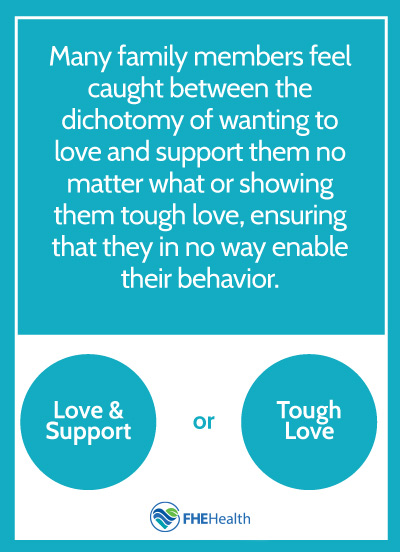
Updated August 2023
When a family member is suffering from the disease of alcoholism and addiction it’s felt by everyone. The pain from their actions can be significant monetarily, emotionally, physically, emotionally and spiritually. However, the truth of the matter is that for this member of our family to embrace and experience recovery to the fullest and undergo a personal transformation to a life beyond their wildest dreams, the support of the family is imperative to help them get there.
 The road to recovery is a rocky one for everyone involved, but there are ways you can support that member of your family from a healthy distance that can make the task more manageable and increase the likelihood of success. Many family members feel caught between the dichotomy of wanting to love and support them no matter what or showing them tough love, ensuring that they in no way enable their behavior.
The road to recovery is a rocky one for everyone involved, but there are ways you can support that member of your family from a healthy distance that can make the task more manageable and increase the likelihood of success. Many family members feel caught between the dichotomy of wanting to love and support them no matter what or showing them tough love, ensuring that they in no way enable their behavior.
5 Ways to Offer Healthy Support to a Family Member
When we talk about providing healthy support to a recovering family member it can be easily misinterpreted as bearing the weight of their sobriety on our own shoulders. This is not the case.
The individual in active addiction is responsible for their own sobriety. While it is a medical condition, the tools for recovery are readily available and it is their own responsibility to do the work to get to the solution. That being said, any support for a recovering member of the family by the rest of the family is sure to help the process. We’ve outlined 5 ways from our experience that have found to be the most successful for providing this support:
- Recovery Fellowships – When a member in your family is in need of recovery there are many free and supportive resources available in our communities 7 days a week. The fellowships of AA/NA/CA/etc. have resources available online that provide information to local meetings. These meetings are full of peers who deal with similar struggles and found a solution to live a life in recovery that provides for a level of joy that your family member may not realize is possible! These groups tend to welcome new members with open arms and can provide your struggling family member with a wealth of love and resources to help them along their journey. While most meetings are closed to non-recovery individuals, offering the member of your family a ride or to cover their uber is a reasonable level of support that can benefit them and keep you physically and emotionally safe. For many people in recovery, meetings like this are the backbone of their sobriety. Seeing people on a regular basis who know what your going through and can offer support and advice is the best way to sustain sobriety.
- Stand Strong – Remember that those in early recovery are sick, this means they are typically highly manipulative in order to achieve unhealthy objectives. This is not a criticism to them as people, it is simply a byproduct of their disease. This is why support also comes in the way of standing firm in your position not to enable this behavior. If they ask for money it’s ok, and important, to say NO. They may say they are starving or in danger, they may criticize your parenting for not being supportive, understand that it is not personal. Extend a loving offer to get them the help they need, but if they refuse for whatever justifiable reason they deploy from their vast arsenal of excuses, reinforce your position. For many, this can be an enormous breakthrough in their recovery process. Showing tough love can be a very difficult process for family members, but often times it is absolutely necessary in order to get the individual to understand they gravity of their addictive lifestyle.
- Clean the House – As you continue to support the member of your family consider treatment, things you may have in the house that you might think a normal part of your lifestyle could be better left outside until they’re in a better place. This includes non-critical medications and alcohol. While early in recovery, it’s important to try and remove as many substances that can make continuing their path of destruction easier to access. Individuals in early recovery can be some of the most professional detectives you ever meet. They can ransack your bathroom, closets and other places you might think make for great hiding places. Your best bet is to remove them for now. Look closely at all prescriptions and medicines you have in your home and remove anything they may be dangerous. Something as small as a few old pills can cause a relapse into months or years of addictive behavior.
- Love Unconditionally – In these times of struggle the individual in our family active in addiction doesn’t feel very loving of themselves. When they’re in the soup, the pain can be overwhelming. In our experience, many times those who recover reminisce on times that helped them get through the pain are when others loved them when they were unable to love themselves. Try to keep in mind that the person you still love is there, they’re just ill. Care emotionally for them as you would any other individual going through difficult times, constantly remind them how much you love them. It is always worth it to maintain support regardless of how many times they have lied to you, stole from you, or wronged you. In the end, their life is always more important and you could be the only thing that is keeping them on the right path. Oftentimes family members need support personally as they deal with a destructive addict. If you need help finding a counselor or just someone who has been through something similar please don’t hesitate to reach out for help.
- Help them build healthy habits. Returning home to “normal life” from a recovery program can be a disorienting experience, especially for someone whose coping strategies have been built around addiction. An adult in recovery typically has an extra 16 to 18 hours of newly unoccupied time each week that would previously have been taken up by finding, using and recovering from substances. Helping a family member with addiction can involve offering new ways to deal with stress or helping them rediscover their joy in old hobbies and activities that don’t involve substance use.
- Stay active and engaged in their recovery journey. It’s sometimes the case that after time in rehab or other addiction treatment, friends and family members assume that recovery is over and the addict is “cured.” The reality is that recovery is an ongoing journey that requires long-term maintenance and management and an ongoing commitment to healthy living. When thinking about how to help a family member with addiction, it’s important to understand that they have a better chance of avoiding relapse with loved ones in their corner who make themselves available, listen during tough periods and even drive them to sessions when necessary.
- Commit to family counseling and therapy. The role of the family in recovery journeys can be stressful for everyone, and family members may need support to deal with a destructive addict. It’s easier to provide the support your loved one needs if the whole family has been able to confront and work through their own traumas. Family counseling is also frequently invaluable in helping the addict see their behaviors from the perspectives of those around them.
Supporting a Family Member in Recovery
We should remember that care and support come in different forms. Offering your hand to help them get the support they need is imperative, but equally as important is maintaining boundaries while reminding them how much you love them. If you have a family member in recovery and not sure what you’re options are, reach out to Florida House for help immediately! We have helped thousands of family members through the process of supporting a loved one in addiction. We have the tools and the team with the experience and compassion necessary to help you every step of the way. We would love to answer an questions or concerns you may have.







